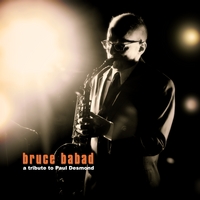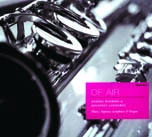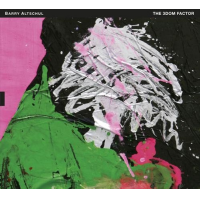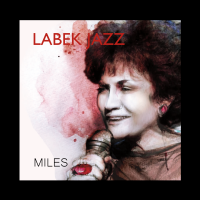Home » Jazz Articles » Big Band Report » Buddy Rich: In a Zone of His Own
Buddy Rich: In a Zone of His Own
Once past that, the band gives a pretty good account of itself, and Taylor is certainly a stellar timekeeper, even though he's no Buddy Rich (no one ever has been, or arguably ever will be). "Wind Machine" is followed by Mike Tomaro's fusion piece, "Conspiracy Theory," the ambitious "Good News Suite" (with a long and impressive solo by Taylor) and "Too Close for Comfort," on which Frater has the same problems with intonation that she had on the CD (when she can be heard above the ensemble). Mention should be made here that several numbers are listed out of sequence on the DVD's jacket (but in the correct order on the menu). The fast-moving "Hit & Run," one of five numbers not on the CD (and on which Taylor perhaps comes closest to emulating Rich), is next up, followed by Pat Metheny's lyrical "It's Just Talk" (inaudible vocalese by Frater), Bob Mintzer's carefree "Party Time," A.J. Ellis' funky "Chicken," the familiar "West Side Story" medley and, last but not least, a smashing encore, Pete Meyers' unrivaled arrangement of Cole Porter's "Love for Sale." Young tenor saxophonist Vasilis Xenopolous is the most frequently heard soloist, and while he's bright and technically sound, he has a way to go to catch up to Don Menza, Steve Marcus or Jay Corre, to name only three of Rich's peerless tenor standouts. Others who create an auspicious impression include alto Richard Sheppard, trumpeter Ed Benstead, tenor Dan Faulkner and pianist Hilary Cameron.
Taylor, who saw Buddy Rich at age twelve and was so impressed he "wound up doing this," does it quite well indeed, and it's reassuring to see and hear someone who is dedicated to keeping Rich's musical heritage alive and swinging. As noted, the concert has its sonic flaws but neither Taylor nor the band can be faulted for that. In spite of its blemishes, one of the better big-band DVDs in recent memory.
In Smaller Packages . . .
 Mike Longo Trio
Mike Longo TrioA Celebration of Diz and Miles
Consolidated Artists Productions
2013
Pianist Mike Longo, best known for his long association with the legendary trumpeter Dizzy Gillespie, for whom he served as music director, celebrates Diz and his equally acclaimed contemporary, Miles Davis, in a live trio session from which trumpets are conspicuously absent. The "celebration," in this case, centers not on the instrument Gillespie and Davis played but rather on the music they wrote, which arguably exceeds even their finest work as instrumentalists—and that is saying a mouthful, as they are generally regarded as two of the most brilliant and creative jazz trumpeters who ever lived. Problem is, Diz and Miles wrote so many memorable tunes that it's impossible to squeeze them into one hour-long performance, even as medleys. Longo has thus chosen five songs by Diz, four by Miles, and the standards "Summertime" (an early-Davis staple) and "You Don't Know What Love Is."
Aside from any thematic scenario, it should be noted that Longo is a first-rate player, as are his teammates, bassist Paul West and drummer Ray Mosca, who have been keeping close company with the leader for many years and are immediately responsive to any changes in emphasis or mood. After opening with Davis' introspective "All Blues," the trio explores one of Gillespie's most enchanting melodies, "Con Alma." A pair of popular works by Miles ("Milestones," "Freddie Freeloader") and two by Gillespie ("Ow!," "Here 'Tiz") lead to "Summertime." The concert sweeps to its denouement with Dizzy's dynamic "Tour de Force," "What Love Is" and Miles' quirky "So What," ending with Dizzy's exhilarating "Night in Tunisia." The unrehearsed performance (Longo gave a list of tunes to the musicians shortly before the curtain went up, and that was that) was recorded in the John Birks Gillespie Auditorium at the Baha'i Center in New York City, where Longo and his wife, Dottie (who are Baha'is, as was Gillespie), present jazz concerts each Tuesday evening.
While sound quality is for the most part admirable, Longo's piano is the slightest bit over-mic'ed, which at times lessens its clarity, but only on fortissimo passages, and even then to a trivial degree. Otherwise, there's not much to censure, as Longo, West and Mosca pledge their allegiance to Diz and Miles with a thoroughly engaging concert that sounds anything but unrehearsed.
 Bruce Babad
Bruce BabadA Tribute to Paul Desmond
Primrose Lane Music
2013
Let's be clear about one thing: alto saxophonist Bruce Babad doesn't sound like Paul Desmond, to whom Babad's impressive concert recording is dedicated—but who ever has? What Babad does bring to the table is Desmond's flawless rhythmic awareness, as well as the late saxophonist's dry, understated yet perceptive musical vocabulary, one that made everything Dave Brubeck's alter ego played seem so incredibly easy. Yes, there are echoes of Desmond in Babad's cool-headed tone and style, but never do they descend into the realm of mere imitation. The kinship is especially explicit on the ballads: "When Sunny Gets Blue," "My Funny Valentine," "Wendy." Elsewhere, Babad nods appreciatively to Desmond while designing a seductive blueprint of his own.
In this live performance, taped at the A-Frame nightclub in Hollywood, Babad is capably supported by his working group: guitarist Larry Koonse, pianist Ed Czach, bassist Luther Hughes, drummer Steve Barnes. And even though Babad's is the most often heard solo voice, each of the others has a chance or two to shine, and dashes eagerly into the breach. Perhaps "ambles" would be more appropriate, as the mood is by and large easygoing and low-key, as befits the album's honoree. An exception is the fast-paced, bop-centered finale, "B*A*B*A*D" (written by guess-who and based on "I Got Rhythm"). Babad also wrote "Jan," while Desmond composed "Wendy," "Take Five" and "Desmond Blue." The session opens on a high note with Gerry Mulligan's lyrical classic "Line for Lyons" and also includes Ellington's "Things Ain't What They Used to Be" and what may seem an unusual choice (but one that works quite well), the late Fred Rogers' "It's You I Like." Babad is sharp on every tune, and loves to amplify his solos with brief quotes from other songs (I counted more than half a dozen, and others surely slipped past).
Although Bruce Babad's name may not be well known beyond his Southern California base, anyone who plays regularly in the Bill Holman Band has chops to spare, as Babad shows on his earnest tribute to Desmond (who surely would have applauded the enterprise). Babad's colleagues are no less talented, and their concert is a buoyant and pleasurable experience.
 OslanDailey Jazztet
OslanDailey JazztetEvidence
Sea Breeze Jazz
2013
Predominantly straight-ahead, swinging themes from four gentlemen whose names are well known in and around Lexington, KY, less well-known elsewhere—even though they should be. After completing their day gigs as faculty members in the Jazz Studies department at the University of Kentucky in Lexington, these superb artists let their creative juices flow as members of the OslanDailey Jazztet, co-led by saxophonist Miles Osland and pianist Raleigh Dailey with rhythmic support from bassist Danny Cecil and drummer John Willmarth. They've been doing that for several years now, as well as playing together for more than a decade in the impressive DiMartino / Osland Jazz Orchestra. A case in which familiarity breeds excellence.
For its second recording, the Jazztet has chosen seven of Dailey's engaging compositions to complement two apiece by Keith Jarrett and Ron Carter, Thelonious Monk's "Evidence" and Carla Bley's "A.I.R." (All India Radio). Dailey, a favorite "unknown" pianist, is a perceptive soloist and accompanist, while Osland is a sharp and resourceful improviser in the post-bop tradition. Osland plays alto saxophone on most tracks, soprano on "A Long Way to Go" and "A.I.R.," flute on Dailey's "Forgetting" and "Wichita Mind Control." Cecil and Willmarth give the front-liners all the support they need, keeping the propulsive fires burning without calling undue attention to themselves. The album includes two "bonus" tracks—the esoteric "A.I.R." and exuberant "Wichita Mind Control"—recorded live at UK's Singletary Center for the Arts (but presumably without an audience, as there is no response). There are no standards on the menu, nor indeed has any of the tunes (with the possible exception of "Evidence") been played often enough to enkindle the grey cells of anyone save the most avid pedant.
Although there are some brief instances of self-indulgence, as on Carter's "Eighty-One" and Jarrett's "Spiral Dance," the music is, for the most part, plain-spoken and enjoyable, and the average listener's reaction should follow a similar course.
 Anders Hagberg & Johannes Landgren
Anders Hagberg & Johannes LandgrenOf Air
Footprint Records
2013
Celestial music, wonderfully performed by Swedish musicians Anders Hagberg (flutes, soprano saxophone) and Johannes Landgren (organ), albeit far more akin to a Sunday morning church service than an evening at a jazz club—an impression that is underscored by an ample measure of reverb (the album may have been recorded in a church). The gossamer themes, drawn from a wide variety of sources, evoke images of towering cathedrals, worshipers with heads bowed in reverence, pilgrims praying at a hallowed shrine. The wind instruments are light and diaphanous, the organ played so softly at times as to be almost inaudible.
The jazz content, it should be noted, is minimal; while there may be impromptu blowing, it is all but impossible to discern unless one is familiar with the songs. Two themes, "The Glass Tree" and "When the Wood Speaks," are noted as free improvisations. For the most part, however, Hagberg plays the melody while Landgren provides a formal harmonic backdrop. Much of the music is liturgical in origin, embodying titles such as "The Blessed Day," "Now Comes the World's Saviour," "Temple Autumn," "Ah, That in Sin We Should Slumber In," "Kyrie," "Procession" and "O Christ, Who Art the Light and Day." Elsewhere, influences range from Pakistani music, ancient Georgian texts and Japanese Shakuhachi flute playing to Bronze Age archaeology, a sixth century Latin hymn and traditional Swedish folk songs.
The music, as noted, is charming, the performance near-flawless, the sound quality beyond reproach. On the other hand, it isn't jazz, at least not in the sense that we normally apply the term. Aimed at those who appreciate inspiring music freed from the annoyance of labels.
Tracks and Personnel
With Eddie Daniels
Tracks: Certified; Inner Lines; Hook or Crook?; Thad's Lament; Entre Nous; Where's Marty?; Elyeska; Cathel Brugha Blues.
Personnel: Steve Williams: leader, composer, arranger, alto sax, clarinet, flute; Brian MacDonald: trumpet; Liesl Whitaker: trumpet; Justin Kisor: trumpet; Tim Stanley: trumpet; Joe Henson: alto sax, clarinet, flute; Luis Hernandez: tenor sax, clarinet, flute; John DeSalme: tenor sax, clarinet, flute; Scott Silbert: baritone sax, bass clarinet, clarinet, piccolo; Jim McFalls: trombone; Jamey Way: trombone; Dave Perkel: trombone; Mark Morgan: bass trombone; Pete McCann: guitar; Harry Appelman: piano; Mike Pope: bass; Joe McCarthy: drums, percussion. Special guest artist—Eddie Daniels: tenor sax (2), clarinet (3), composer (2-4).
The Change
Tracks: Caravan; Round Midnight; The Change; Dawn Before Dark Before Dawn; Return Flight; Agro Alegria; Hush; Summer Sundays; Barbara; Lady Be Good; Feeling Good.
Personnel: Mark Armstrong: music director, trumpet (2); Louis Dowdeswell: trumpet, flugelhorn; Adam Chatterton: trumpet, flugelhorn; Nick Dewhurst: trumpet, flugelhorn; Tom Dennis: trumpet, flugelhorn; James Copus: trumpet, flugelhorn; Anna Drysdale: horn; Helen Wilson: flute, alto flute; Phil Meadows: alto, soprano sax, flute; Jim Gold: alto sax, clarinet; Nadim Teimoori: tenor sax; Riley Stone-Lonergan: tenor sax; Chris White: baritone sax, flute; Ross Anderson: trombone; Pete Whitehouse: trombone; Tom Green: trombone; Chris Valentine: trombone; Barry Clements: bass trombone; Chris Eldred: piano; Rob Luft: guitar; Conor Chaplin: bass (1, 4, 7, 8, 11); Joe Downard: bass (2, 3, 5, 6, 9, 10); Scott Chapman: drums (1-3, 5, 7-11); Felix Higginbottom: percussion; Emma Smith: vocals (8, 10). Guest artists—Tim Garland: composer, arranger, tenor, soprano sax (2, 4, 6); Mark Mondesir: drums (4, 6).
Family Suite for Large Ensemble
Tracks: Dark Autumn (Movement I); The Prod / Sister Kim (Movements II & III); Four Shades of Darkness (Movement IV); Four Shades of Light (Movement V); Chorale / Martha (Movements VI & VII); Blues for Jerome (Movement VIII); I See Your Face Before Me / Thank You for the Life You Have Given Me (Movements IX & X); Dark Autumn: Reprise (Movement XI).
Personnel: Kirk MacDonald: leader, composer, alto, soprano sax; Terry Promane: arranger, trombone; Jason Logue: trumpet; Brian O'Kane: trumpet; Rob Smith: trumpet; Kevin Turcotte: trumpet; Joe Sullivan: trumpet; P.J. Perry: alto sax; Luis Deniz: alto, soprano sax; Pat LaBarbera: tenor sax; Perry White: baritone sax; Al Kay: trombone; Kelsley Grant: trombone; Collin Murray: trombone; Lorne Lofsky: guitar; Nancy Walker: piano; Neil Swainson: bass; Barry Romberg: drums.
Thank You, Fos!
Tracks: Thank You, Fos!; Shiny Stockings; Bring on the Raindrops; One Two Three; Love Handles; Lady Carolyn; Jorg on the Road; Ode to Joe Newman; Whirly Bird; Sina's Dream; Come On In; Papa Fos.
Personnel: Dani Felber: leader, flugelhorn solos (7, 8); Andrea Tofanelli: trumpet; Nemanja Jovanovich: trumpet; Gabriel Keogh: trumpet; Rich Laughlin: trumpet; Brad Leali, Jonas Knecht, Eric Marienthal, Sebastian Borkowski, Helga Plankensteiner: reeds; Jurgen Neudert: trombone; Adrian Weber: trombone; Uli Binetsch: trombone; Fabian Beck: trombone; Jura Waida: piano; Bernd Hess: guitar; Rodrigo Aravena: bass; Butch Miles: drums; Carmen Bradford: vocals (3, 12).
Lab 2012
Tracks: Be That Way; Abby Song; Shiny Stockings; The Fifth Shade; The Sparrow Was Gone in an Instant; Fugue for Thought; From Above; 3rd and 55th; Race to the Finish.
Personnel: Steve Wiest: director; Tyler Mire: trumpet; Jake Boldman: trumpet; Miranda George: trumpet; Jordan Gheen: trumpet; Miles Johnson: trumpet; Justin Pierce: alto, soprano sax; Alex Fraile: alto sax; Aaron Hedenstrom:tenor sax; Drew Zaremba:tenor sax; Spenser Liszt: baritone sax; Kevin Hicks: trombone; Jenny Kellogg: trombone; Julie Gray: trombone; Jon Gauer: bass trombone; Sean Casey: bass trombone; Sean Giddings: piano; William Flynn: guitar; Brian Ward: bass; Greg Sadler: drums.
Miraculous Loss of Signal
Tracks: A Forwaholic's Passion, Part I; A Forwaholic's Passion, Part II; Narcotic Incotriac; Wheeling Around That SO.FI; Lotus Flower; Miraculous Loss of Signal; Enacted Disorder; Hurdles.
Personnel: Johannes Berauer: conductor; Reinhold Schmolzer: composer, arranger, drums; Bernhard Nolf: trumpet, flugelhorn; Benny Brown: trumpet, flugelhorn; Matthias Spillmann: trumpet, flugelhorn; Florian Menzel: trumpet, flugelhorn; Johannes Bohmer: trumpet, flugelhorn; Florian Trubsbach: soprano sax, clarinet, flute, piccolo; Charlotte Greve: alto, soprano sax, clarinet, flute; Uli Kempendorff: tenor, soprano sax, clarinet, bass clarinet; Malte Schiller: tenor sax, clarinet; Tini Thomsen: baritone sax, bass clarinet, c-flat clarinet; Simon Harrer: trombone; Phil Yaeger: trombone; Lukas Wyss: trombone; Jan Schreiner: bass trombone; Raphael Meinhart: vibraphone; Manuel Schmiedel: piano; Andreas Waelti: bass.
Front Burner
Tracks: Runferyerlife; Second Race; Tijuca; Cubauza; Blood Count; Front Burner; No Waddi (Is It Far?); Armando's Big Band; Swingin' for the Fences; Lost; Some Graffiti on the "A" Train.
Personnel: Jazz Orchestra 1 (Tracks 1-6, 8, 9)—Antonio J. Garcia: director, claves, guiro (4); Ben Heemstra: trumpet, flugelhorn; Jackson Shurlds: trumpet, flugelhorn; Adam Johnson: trumpet, flugelhorn; Victor Haskins: trumpet, flugelhorn; Brendan Schnabel: soprano, alto sax; Douglas Jemison: alto sax; Myrick Crampton: tenor sax, flute; Aaron Williams: tenor sax; Trey Sorrells: baritone sax; Christopher Bates: trombone; Colleen Trempe: trombone; Martha Purvis: trombone; Mark James: bass trombone; Keith Askey: guitar; Brian Mahne: piano; Andrew Randazzo: acoustic, electric bass; C.J. Wolfe: drums, timbales (4); Joe Lubman: congas (4). Small Jazz Ensemble (Track 7)—Victor Haskins: trumpet; Myrick Crampton: tenor sax; Brian Mahne: piano; Andrew Randazzo: bass; C.J. Wolfe: drums. Faculty Jazz Septet (Tracks 10, 11)—Rex Richardson: trumpet; John D'Earth: trumpet (11); Skip Gailes: tenor sax; J.C. Kuhl: tenor sax (10); Antonio Garcia: trombone, vocals; Mike Ess: guitar; Russell Wilson: piano; Victor Dvoskin: bass; Tony Martucci: drums. Guest artists—John Riley: drums; Taylor Barnett: trumpet; Graham Breedlove: trumpet.
To Buddy Rich and Beyond . . .
Tracks: Wind Machine; Conspiracy Theory; West Side Story medley; Too Close for Comfort; Party Time; The Chicken; It's Just Talk; Good News Suite; Hit & Run; Love for Sale.
Personnel: Steve Taylor: drums, leader; Dave Wood: trumpet; Tom Walsh: trumpet; Ed Benstead: trumpet; Sam Eastmond: trumpet; Richard Sheppard: alto sax; Rob Sell: alto sax; Vasilis Xenopolous: tenor sax; Dan Faulkner: tenor sax; Mike Rubie: baritone sax; Ben Greenslade: trombone; Sam Crooks: trombone; Dave Candy: trombone; Ollie King: trombone; Hilary Cameron: piano; Dan Farrant: bass; Josie Frater: vocals.
A Celebration of Diz and Miles
Tracks: All Blues; Con Alma; Milestones; Ow!; Freddie Freeloader; Here 'Tiz; Summertime; Tour de Force; You Don't Know What Love Is; So What; A Night in Tunisia.
Personnel: Mike Longo: piano; Paul West: bass; Ray Mosca: drums.
A Tribute to Paul Desmond
Tracks: Line for Lyons; When Sunny Gets Blue; It's You I Like; My Funny Valentine; Things Ain't What They Used to Be; Wendy; Take Five; Jan; Desmond Blue; B*A*B*A*D.
Personnel: Bruce Babad: alto saxophone; Larry Koonse: guitar; Ed Czach: piano; Luther Hughes: bass; Steve Barnes: drums.
Evidence
Tracks: Evidence; Title Goes Here; Mode Three; As Long as You Know You're Living Yours; Forgetting; Eighty-One; The Letter; Spiral Dance; A Long Way to Go; R.J.; Flashpoint. Bonus tracks—Wichita Mind Control; A.I.R. (All India Radio).
Personnel: Miles Osland: saxophones, flute; Raleigh Dailey: piano; Danny Cecil: bass; John Willmarth: drums.
Of Air
Tracks: Den Signade Dag; Ali Khan; Romelni Kerubinta; Varldens Fralsare Kom Har; Tempelhost; Ack, Atti Synd vi Slumra Bort; Kyrie; Strax; Glastradet; Rop; Procession; Focus; O Kriste, du Som Ljuset Ar; When the Wood Speaks; I Vantan pa Varen; Den Signade Dag.
Personnel: Anders Hagberg: flutes, soprano saxophone; Johannes Landgren: organ.
New and Noteworthy
1. R:3 Special Big Band, R3 (Summit Records)
2. Bob Mintzer Big Band, For the Moment (MCG Jazz)
3. Kris Berg / Metroplexity Big Band, This Time / Last Year (MAMA Records)
4. Albert-Hobbs Big Band, Love Remembered (Eidolon Productions)
5. Sandviken Big Band, In the Name of Freedom (Imogena)
6. Steve Taylor Big Band Explosion, Live in London (i2i Music)
7. Joe Chambers Moving Pictures Orchestra, Live at Dizzy's
8. Bob Wilber and the Tuxedo Jazz Orchestra, Rampage! (Arbors Jazz)
9. Howard University Jazz Ensemble, Ode to Life (HUJE Jazz)
10. DiMartino / Osland Jazz Orchestra, Quotient (Sea Breeze Jazz)
11. Washington State University, Zoot Suit (WSU Recordings)
12. Brussels Jazz Orchestra, A Different Porgy, Another Bess (Naïve)
13. Urban Renewal Project, Go Big or Go Home (URP Music)
14. Empire Jazz Orchestra, Accentuate the Positive (EJO)
15. Eastern Illinois University, Three O'Clock Downbeat (Self Published)
Tags
Buddy Rich
Big Band Report
Jack Bowers
United States
Artie Shaw
Claude Thornhill
Miles Davis
Gil Evans
Don Menza
David Angel
Bill Holman
Tom Kubis
Mike Barone
Steve Huffsteter
Gordon Goodwin
Bob Curnow
Roger Neumann
Kim Richmond
William Russo
WIlbur Ware
Jim Ketch
Marcus Printup
Terell Stafford
Stephen Riley
Jack Wilkins
Wycliffe Gordon
Ron Westray
Paul McKee
Dave Stryker
Jason Marsalis
Leon Anderson
Herlin Riley
Rodney Jordan
Rodney Whitaker
Marcus Roberts
Aaron Diehl
Dan Nimmer
Bill Peterson
George Gruntz
duke ellington
Jon Faddis
Woody Shaw
Lee Konitz
Joe Henderson
Elvin Jones
Paul Motian
Marian Montgomery
claire martin
John Bassett
Dudley Moore
Steve Williams
Liesl Whitaker
Joe McCarthy
eddie daniels
Mark Morgan
Pete McCann
Harry Appelman
Mike Pope
Thad Jones
Mel Lewis
Luis Hernandez
Jim McFalls
Scott Silbert
Bill Ashton
Tim Garland
Nikki Iles
Juan Tizol
Julian Joseph
Mark Mondesir
Kirk MacDonald
Rob McConnell
Lorne Lofsky
Neil Swainson
Kevin Turcotte
Nancy Walker
P.J. Perry
Dave McMurdo
Frank Foster
Dani Felber
Count Basie
Neal Hefti
Brad Leali
CARMEN BRADFORD
Butch Miles
Eric Marienthal
Chick Corea
Joe Newman
Andrea Tofanelli
Steve Wiest
Don Cherry
Reinhold Schmolzer
Phil Yaeger
Sammy Nestico
bob mintzer
randy brecker
Michael Philip Mossman
Billy Strayhorn
Wayne Shorter
John D'Earth
John Riley
Woody Herman
Gus Arnheim
Isham Jones
Jimmy Giuffre
Ralph Burns
Stan Getz
Zoot Sims
Herbie Steward
Serge Chaloff
Bobby Shew
Shorty Rogers
Terry Gibbs
Sal Nistico
Frank Tiberi
Phil Woods
Bud Shank
Stan Kenton
pat metheny
Steve Marcus
Jay Corre
Mike Longo
Dizzy Gillespie
Paul West
Paul Desmond
Dave Brubeck
Larry Koonse
ED CZACH
Luther Hughes
Steve Barnes
Gerry Mulligan
Miles Osland
Keith Jarrett
Ron Carter
Thelonious Monk
carla bley
PREVIOUS / NEXT
Support All About Jazz
 All About Jazz has been a pillar of jazz since 1995, championing it as an art form and, more importantly, supporting the musicians who make it. Our enduring commitment has made "AAJ" one of the most culturally important websites of its kind, read by hundreds of thousands of fans, musicians and industry figures every month.
All About Jazz has been a pillar of jazz since 1995, championing it as an art form and, more importantly, supporting the musicians who make it. Our enduring commitment has made "AAJ" one of the most culturally important websites of its kind, read by hundreds of thousands of fans, musicians and industry figures every month.



















